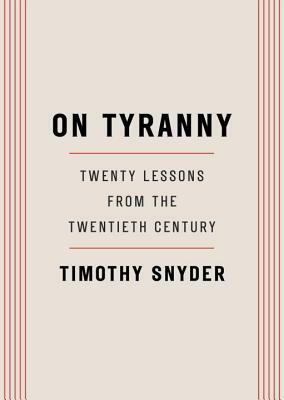bl_r reviewed On Tyranny by Timothy Snyder
A milquetoast liberal take on tyranny
2 stars
This book has a very centrist liberal take on tyranny, and while Snyder makes some good points, he contradicts himself, and has a blindness to tyranny happening on the home front.
This book uses lessons from abroad to discuss tyranny without actually defining it. I'm fine with tyranny having a loose meaning when being discussed between normal people, but in a book written by a Yale professor of history? I don't think that's acceptable. To Snyder, tyranny is simply what the Communists did, what the Nazis did, and what Putin does (and what Trump is trying to do). Not a very useful definition. Ironically, he does provide a useful definition of "totalitarian", a less common word that I frequently see meaninglessly slung around in political discourse.
Snyder also contradicts himself. For example, he will spend a chapter praising journalism and the media. This is fine. He draws a distinction between print and digital news, and arbitrarily states that print media is more truthful, and online media creates a reality show where things are less real, and therefore things cannot affect politicians. In a later chapter, he will condemn the media for taking the bait and talking about Clinton's emails, claiming that "media preferred to mindlessly indulge the inherently salacious interest we have in other people's affairs" and comparing the political scandal to a fashion journalist not taking photos of a changing model, which is just simply a terrible comparison.
Some of Snyder's better points, such as how "extremist" and "terrorist" are often used as political insults to slander individuals and groups of people, and are devoid of real meaning in many cases because of that. He uses the example of the state claiming rights must be taken away to protect the people from terrorists, but simultaneously accepts this framing as inherently legitimate. One point he makes that I like that I cannot fault is his very brief analysis on how fascists manipulate the laws to gain power and exercise authority while capitalizing on disaster (real or not) to cement it.
Finally, and most annoyingly, Snyder is painfully blind to tyranny on the home front in true centrist liberal fashion. Pointing only at Trump, and disparate acts (such as the patriot act) to point at tyrannic at home, while ignoring the massive history of tyranny in the US. Throughout the book, there is only one mention of black struggle against tyranny, and it is, in full, "Remember Rosa Parks." even if the rest of the historic examples are all from the same time period abroad. Nothing is mentioned about the genocide stemming from colonialism, massive oppression of indigenous people, slavery, or the Japanese concentration camps.
All things said, this book is probably not the best resource on tyranny.

